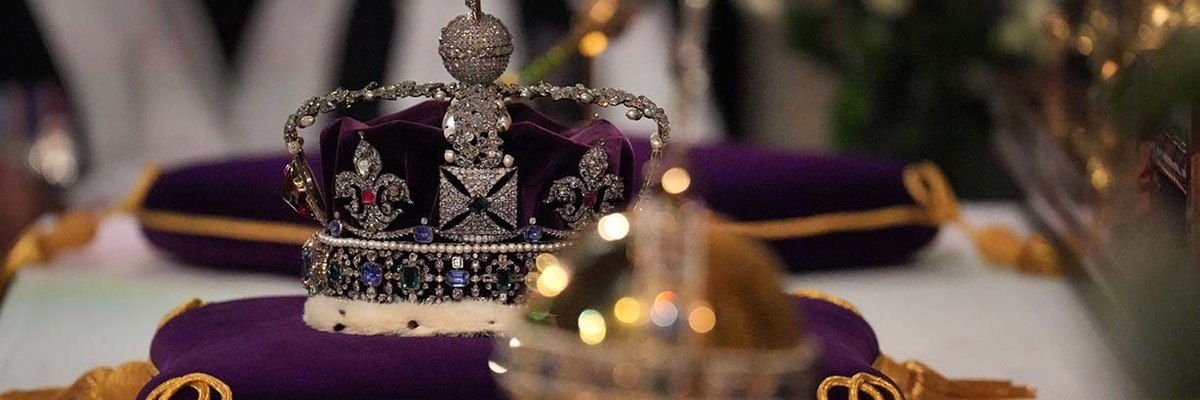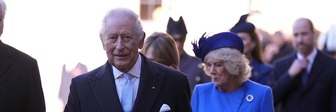The last time I ventured to address monarchical matters in this space the royal family had a net favourability score on the YouGov tracker of +41. That was soon after the death of the Queen. Six months later that score has fallen to +30. Unsurprising, perhaps, given that the new king’s second son has spent most of his time – aided and abetted by his loving wife – dishing the dirt on his closest relatives. Not least his once dear Papa. But might we not have expected that to have been counter-balanced by the frenzy of expectation and (in some papers at least) the saturation coverage given to the greatest show the nation has to offer? The first coronation for seventy years. Perhaps the nation is growing weary of an institution that seems to be at war with itself. Or perhaps the great spectacle - now only three weeks away – will see off the doubters and restore the hopes of the dreamers.
On one level at least this past week has laid to rest the worst nightmares of those who repose so much hope in the revitalising power of the coronation. The news that Meghan will not be present will have many a courtier sleeping easier in their beds. Quite why she took the decision we may never know – assuming that she or her husband do not decide to spill the beans in yet another confessional interview or, perhaps, a new chapter in the autobiography which is surely begging to be rewritten for a tidy sum.
There may, of course, be the most innocent of explanations. The fourth birthday of their son Archie falls on the same day that his grandfather has St Edward’s crown placed on his head in Westminster Abbey and Meghan can hardly be blamed, as a dutiful mother, for wanting her son to have her undivided attention on his special day. Equally she may have felt that her presence would have been a pretty massive distraction for that section of the media (a very large section) desperate for some footage of her being snubbed by her sister-in-law. Many people will, no doubt, applaud her for that.
Others are taking a less charitable view. They see her decision to stay away as a direct snub to Buckingham Palace if not to the King himself. They point to the way she and Harry have behaved towards the royal family – especially William, Kate and Charles himself. It suggests that they were hardly likely to be treated as the most honoured of guests if they had both attended. And members of the large club of full-time Meghan-watchers say it was never remotely likely that she would have accepted the role that would surely have been assigned to her: a seat about as far as it’s possible to get from the front rows of honoured guests. Nor would they have been invited to join other senior royals to wave to the adoring crowds from the balcony of Buckingham Palace.
Serious royal watchers like Robert Lacey have no doubt that there were indeed negotiations over their presence between the Palace and Montecito, home of the Sussexes. They point out that the coronation invitations went out more than a month ago, so Harry and Meghan could have responded long since and ended much damaging speculation. As Lacey put it: “There are invitations. And there are invitations. The seating may have been the substance of what has not been resolved to their satisfaction… It’s all about negotiating over the Abbey equivalent of Siberia as to where Harry was going to be seated”.
But a swift response, say their critics, would have defeated the object of the exercise from their perspective. The critics say causing harm to the Royal Family is precisely what they have been seeking to do almost from the start of what was once seen by many outsiders as a marriage made in heaven. They point out that this would have been the first time Harry would have appeared in a public setting with the king, Camilla and William since the publication of his massively controversial memoir, “Spare”. He not only fiercely criticised Charles as a father, but he accused William of physically attacking him, called Camilla “dangerous” and accused her of sacrificing him on her “personal PR altar”. And much else besides.
Lacey believes the book damaged Harry’s fragile relationship with his brother beyond repair and made even more troubling his dealings with the king and the rest of the family. Even so, he says, the king has “acted with a combination of firmness and conciliation… in that he made clear early on that they were both welcome at his coronation”. And he believes the fact that Harry is coming “actually says quite a lot of hopeful things, considering what Harry has said about his father, and his apparent condemnation of his father, and his being willing to put that aside. So, it could be a step forward.”
But a step towards what? The polling carried out by YouGov and other organisations make pretty clear that King Charles has a tough job on his hands as he tries to restore the respect in which it the monarchy was held in the salad days of his late mother’s reign. We can only guess at the despair – and doubtless anger too – that he surely felt when he read the exposé published last week in The Guardian of the vast amounts of money he and the most senior members of his family have been handed to them by the State over recent decades. The Guardian is not alone in calling for far greater transparency in the royal family’s financial affairs.
And as for their family affairs, it points out that the Windsors may not be the only unhappy family in modern Britain but they are “the only one required to embody the nation as a whole. They are holding up a bleak mirror to the nation’s and the world’s gaze, from which no one emerges with credit. It reflects badly on Britain’s institutions, from the monarchy to the media, and we all know it.”
The Guardian says there is plenty of blame to go round but there is “little point in taking sides in the family’s quarrels. Newspapers should be particularly cautious about taking a one-sided approach when the press has so often played such a destructive role in past royal stories.”
It concedes that Britain has worse problems than the monarchy but the danger to the Windsors exists. “It is real and it is growing. It comes at a transitional time for the monarchy, as our oldest ever new monarch prepares for a coronation that, at least in theory, ought to celebrate and help to unify the nation. That feels like an ambition too far, right now. Prince Harry’s campaign has renewed the relevance of Walter Bagehot’s famous warning about the dangers of letting daylight in upon magic.
“The clearest solution,” The Guardian says, “would be the republican settlement we ultimately favour. In the meantime, however, an enormous chance is being missed to reshape Britain’s constitutional monarchy for the post-Elizabeth age. There is responsibility to share here too. King Charles and his inward-looking circle deserve some of it. The danger is that Britain’s 21st-century monarchy is being defined ad hoc by an elite consisting of a palace clique and an overly deferential governing culture.”
So what is the alternative? Here’s The Guardian’s proposal: “Instead of wallowing in royal gossip or drooling over the supposed timelessness of coronation rituals, Britain needs to decide how a system of constitutional monarchy that retains public support can be made better and reformed. The size of the royal family should be reduced, its titles reined in, some of its palaces sold off, the honours system recast, the coronation rethought and the monarch’s role as head of any state other than the United Kingdom ended. Harry Windsor should be left to live his new life.
“Civil society has failed to face these issues. There has been no parliamentary and scarcely any other civic examination of the modern role, powers and appropriate cost of the monarch and the royal family. Rare attempts to do so have instead been stamped on. But it is not too late to do better.”
And yet, as even The Guardian concedes, in the court of public opinion the monarchy has survived the campaign launched against the Windsors by the Sussexes’ campaign thus far. And, as YouGov’s own polling has shown, the institution retains the support of the majority. Many more people disapprove of Harry’s campaign than sympathise with it. Republicanism is not surging. But the polls show pretty clearly that support for it by young people has fallen steeply over the years and continues to fall. Surely something even the most bullish monarchist should worry about.
So where do you stand? Do you agree that the monarchy is an institution, a system and a culture crying out for some new thinking and reform and, if so, do you believe our new monarch is the man to make it happen? Or do you believe that we may be witnessing the start of the closing chapter of a story that has gripped this nation for the best part of a thousand years? Do let us know.






